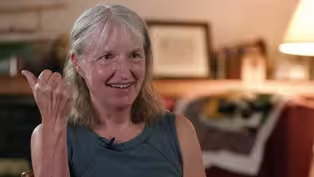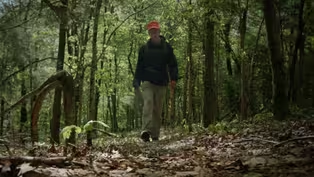
Shark Trackers
Clip: Season 5 Episode 21 | 7m 9sVideo has Closed Captions
Atlantic White Shark Conservancy biologists tag sharks off the coast of Cape Cod.
The population of great white sharks in New England is booming thanks to environmental protections put in place decades ago. The Atlantic White Shark Conservancy identified more than 800 individual sharks over a four-year period. That marine conservation success story may come at a cost to beachgoers, as biologists say most sharks tend to feed in water that is less than 15 feet deep.
Problems playing video? | Closed Captioning Feedback
Problems playing video? | Closed Captioning Feedback
Rhode Island PBS Weekly is a local public television program presented by Ocean State Media

Shark Trackers
Clip: Season 5 Episode 21 | 7m 9sVideo has Closed Captions
The population of great white sharks in New England is booming thanks to environmental protections put in place decades ago. The Atlantic White Shark Conservancy identified more than 800 individual sharks over a four-year period. That marine conservation success story may come at a cost to beachgoers, as biologists say most sharks tend to feed in water that is less than 15 feet deep.
Problems playing video? | Closed Captioning Feedback
How to Watch Rhode Island PBS Weekly
Rhode Island PBS Weekly is available to stream on pbs.org and the free PBS App, available on iPhone, Apple TV, Android TV, Android smartphones, Amazon Fire TV, Amazon Fire Tablet, Roku, Samsung Smart TV, and Vizio.
Providing Support for PBS.org
Learn Moreabout PBS online sponsorship- Just when you thought it was safe to go back in the water...
It's not that little.
Comes a pointed reminder that you might want to think twice, at least in Cape Cod.
I guess the the headline is there are lots of sharks here, more than we thought.
- Yes.
- Meghan Winton of the Atlantic White Shark Conservancy is one of the authors of a new study documenting a surge in the population of great white sharks here in recent years.
And what's your best estimate?
- So the best estimate is over that four-year period, that 800 individual white sharks visited the waters off of Cape Cod.
- [David] She and her colleagues have spent years patrolling these waters, tracking every shark they encounter.
- Nauset ORV.
Yeah.
- [David] You think about a signing?
They recently let us tag along.
- We did just get one.
Okay.
So it says white shark spotted 100 yards off southernmost part of Nauset ORV.
- [David] Overhead, they have a spotter plane.
The pilot, Wayne, keeps a sharp eye out.
- [Wayne] I think I just passed one, so I'm making a 180 here.
- [David] On the boat, they have underwater cameras and microphones and a ready supply of these things.
- It's just kind of like an easy pass for sharks.
This thing.
(David laughs) I mean, that's the simplest way to explain it.
- Do you charge toll?
- We should start.
- [David] A radio beacon with batteries that last 10 years.
Every time a tagged shark swims past one of these yellow buoys, it sends out a ping.
The conservancy relies on citizen sightings too from a growing number of eco tour boats.
You get to see some?
- Yeah, we saw one.
- Yeah.
- It's super shallow here.
About 14 feet.
It wasn't tagged.
- The people on that boat tell us they saw a 14-footer here moments ago.
Every sighting from people or pings gets relayed to an app you can download, Sharktivity.
They've identified more than 600 individual sharks here over the past 10 years.
Many of the sharks are return customers.
So I bet your app is fairly popular among beach-goers.
- I mean, I'd like to think so.
It is.
It's been downloaded over 100,000 times at this point, and it's a great platform for us to report sightings when we're out on the water, for eco tour boats to report sightings, and for anybody who's out.
- Sure.
- So it's a great citizen science tool.
It'll be more fun when there's a shark.
- [David] Meghan and her team deploy a hydrophone, an underwater microphone, listening for a ping from a tracker.
- Oh, look at!
Wow!
- [David] False alarm.
All we find here is this school of stripers, the shark apparently long gone.
(water splashes) (dramatic music) It may come as a surprise to know that nearly 50 years ago when Steven Spielberg scared the pants off just about everybody with his iconic movie about sharks in this part of the Atlantic, the population of great whites here was in danger of dying out.
- You're gonna need a bigger boat.
- [David] Greg Skomal was still in grade school when "Jaws" came out.
The movie caught his imagination in the best possible way.
- I was motivated by the scientist in the film, as were a lot of colleagues of mine at the time to become shark biologists, you know?
So as a young kid watching that, I was thinking, wow, this is a really cool job.
(researchers cheering) - [David] Skomal has personally tagged more than 300 sharks, fulfilling his dream at a time when Cape Cod is finally beginning to see the dividends of decades of marine conservation efforts.
Over the last 50 years, the Marine Mammal Protection Act gradually helped bring back the seals and the sharks who prey on them.
- If you think about it, in the time that both sharks and seals were gone, you know, Cape Cod has exploded as an area that draws people to enjoy this environment.
And so now the predator's coming back to feed on its prey, but it's overlapping with human activities and certainly humans are not used to that.
And so, you know, but they're coming to grips with it.
(drone hums) - The team deploys a drone for a bird's eye view of the water.
What they tend to find is that the sharks spend about half their time in water that's less than 15 feet deep.
- We've got the seals, which love the beautiful beaches of Cape Cod.
So do people.
And the sharks are coming in close to shore to hunt for seals.
So there is an overlap of these three species.
- It has a tag.
Finally, late in the day, a bonafide sighting.
- [Greg] Pretty.
- [David] Greg Skomal climbs out onto the pulpit like a friendly Captain Ahab, armed not with a harpoon, but a GoPro camera.
A 14-footer, a teenager, not yet fully grown.
Great white sharks are four feet long when they're born.
They can grow up to 20 feet long, their lifespan more than 70 years.
- So that shark right there is one that we tagged a few weeks ago, right in this exact same area.
So clearly it's been sticking around.
And I think the only reason they stick around is if they're successfully feeding because no point in staying in an area where you're not having any success.
I love it.
He's just staying in the shallows.
- [David] Most of the regulars have nicknames.
Not this one yet.
Who gets to name it?
- We've got a donor in the queue who gets to name that shark.
And that program helps us fund the cost of research trips.
- So you contribute a little to the work that you guys are doing-- - Yes.
Yes.
- And you get to name a shark.
- Exactly.
It's a pretty cool thing.
- [David] How much does a shark's name go for these days?
- [Meghan] $2,500, which covers the cost of a research trip.
- [David] That nickname will pay for another day out on the water like this one.
Adopt a Shark.
- [Meghan] It's basically an Adopt a Shark program.
(uplifting music) - And that's our broadcast this evening.
I'm Pamela Watts.
Video has Closed Captions
Clip: S5 Ep21 | 9m 24s | The hidden history of Martha’s Vineyard Sign Language. (9m 24s)
Video has Closed Captions
Clip: S5 Ep21 | 8m 48s | A former Providence Journal columnist and editor is forging a new path hiking Rhode Island. (8m 48s)
Providing Support for PBS.org
Learn Moreabout PBS online sponsorship
- News and Public Affairs

Top journalists deliver compelling original analysis of the hour's headlines.

- News and Public Affairs

FRONTLINE is investigative journalism that questions, explains and changes our world.












Support for PBS provided by:
Rhode Island PBS Weekly is a local public television program presented by Ocean State Media

